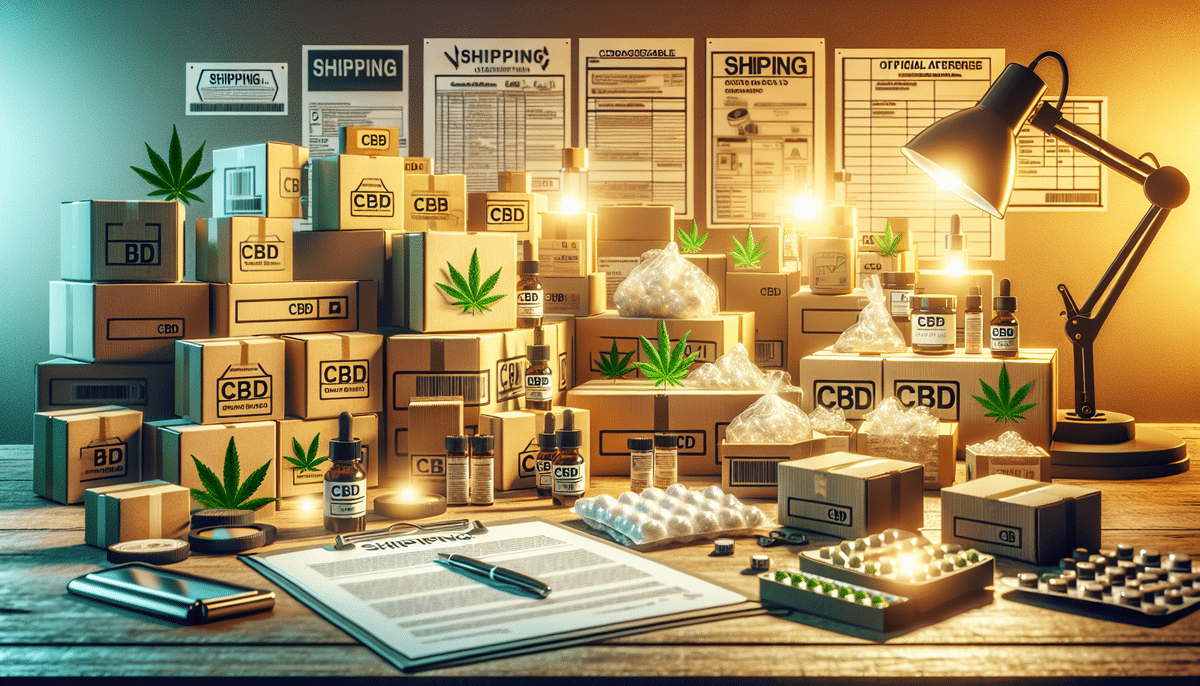How to Safely Ship CBD Products
As the CBD market continues to experience significant growth, projected to reach over $20 billion by 2024 according to [Grand View Research](https://www.grandviewresearch.com/industry-analysis/cbd-market), the need for safe and effective shipping methods becomes increasingly important. This article provides an in-depth analysis of everything you need to know to ship CBD products safely and securely. From understanding the legal landscape to selecting the right packaging materials and ensuring compliance with carrier guidelines, we cover all essential aspects of CBD product shipping.
The Legal Landscape of Shipping CBD Products
Understanding the legal framework is crucial before shipping CBD products. Under federal law, CBD derived from hemp containing less than 0.3% THC is legal, as per the [Agricultural Improvement Act of 2018](https://www.federalregister.gov/documents/2018/12/20/2018-27446/industrial-hemp-rule-finalized-under-the-farm-bill). However, state laws can vary significantly. It's essential to research the regulations in both the supplier’s and the buyer’s states to ensure compliance and avoid legal complications.
The legal landscape is continually evolving. Staying updated with changes through reputable sources such as the [U.S. Food and Drug Administration (FDA)](https://www.fda.gov/news-events/public-health-focus/fda-regulation-cannabis-and-cannabis-derived-products-including-cannabidiol-cbd) and consulting with legal professionals specializing in the CBD industry can help businesses navigate these complexities effectively.
Understanding the Different Types of CBD Products
CBD is available in various forms, including edibles, oils, tinctures, lotions, and more. Each product type may require different packaging materials and shipping methods. For instance, CBD oils often need specialized packaging to prevent breakage and leakage, ensuring the product arrives intact.
The method of consumption also plays a role in shipping considerations. Edibles, such as gummies or chocolates, offer a discreet and convenient way to consume CBD but may require careful packaging to maintain product integrity. Additionally, dosage accuracy can vary with edibles, so clear labeling and instructions are essential.
Navigating the Complex Regulations for Shipping CBD Products
Shipping CBD involves adhering to complex regulations that vary by carrier and location. Many carriers have strict requirements regarding proper labeling and documentation. It’s vital to research the specific regulations of your chosen carrier, such as [UPS](https://www.ups.com/us/en/services/shipping-insights.page) or [FedEx](https://www.fedex.com/en-us/shipping/international.html), to ensure compliance and avoid shipping delays or package rejection.
Additionally, the legal status of CBD in the destination region must be verified. While CBD is legal in many areas, it remains prohibited in others, both within the U.S. and internationally. Conduct thorough research on the legality of CBD in the destination to prevent legal issues and potential fines.
Choosing the Right Packaging Materials for Safe Shipping
Selecting appropriate packaging materials is essential to protect CBD products during transit. Use sturdy and secure materials such as bubble wrap, packing peanuts, and cushioning agents to prevent breakage, leakage, or damage. Tamper-evident packaging can also enhance product security.
Consider the environmental impact when choosing packaging materials. Eco-friendly options like biodegradable packing peanuts, recycled cardboard boxes, and compostable mailers not only reduce waste but also appeal to environmentally conscious consumers.
Ensure that all packaging materials comply with relevant regulations and are properly labeled. Partnering with a reputable packaging supplier familiar with CBD shipping regulations can help maintain compliance and avoid potential issues.
Tips for Properly Labeling Your CBD Products for Shipping
Proper labeling is critical for the safe and compliant shipment of CBD products. Labels should include key information such as the product name, weight, ingredient list, and usage instructions. Clear and accurate labeling helps comply with carrier guidelines and legal requirements.
Include any necessary warnings or disclaimers on the label, such as potential side effects, dosage recommendations, and legal restrictions. Providing this information upfront helps prevent misunderstandings and legal complications.
The Importance of Proper Documentation when Shipping CBD Products
Accurate documentation ensures smooth shipping and delivery processes. Essential documents may include bills of lading, proof of purchase, and relevant certificates. These documents serve as evidence of shipment and delivery, which is crucial in case of disputes or legal issues.
Given the legal complexities surrounding CBD, comprehensive documentation is even more critical. Ensure all necessary paperwork is in order to comply with local and federal laws, thereby avoiding delays, fines, or legal actions.
How to Ensure Your CBD Products Remain Safe and Potent During Shipping
Maintain the safety and potency of CBD products during shipping by taking necessary precautions. Use vibration-resistant packaging and avoid extreme temperature fluctuations to protect product quality. Opting for expedited shipping or specialized shipment services can reduce transit time and minimize potential damage.
Ensure compliance with all federal and state regulations, including obtaining necessary permits or licenses and proper labeling. Clear communication with customers about the shipping process, potential risks, and delays is also essential. Providing tracking information and offering insurance options can enhance customer trust and satisfaction.
Best Practices for Shipping CBD Products Internationally
International shipping of CBD products involves navigating diverse health regulations and legal requirements. Research and understand the international laws governing CBD in the destination country. Partner with experienced international shipping providers to ensure compliance with all regulations.
Properly label all CBD products for international shipments, detailing the contents, quantity, and intended use. Some countries have specific labeling requirements, so ensure compliance to avoid customs delays or rejections. Additionally, use secure and discreet packaging to protect the products and maintain their quality during transit.
How to Handle Shipping Issues and Disputes with Customers
Even with robust shipping practices, disputes can arise. Develop a clear plan for handling shipping issues, emphasizing transparent communication with customers. Provide detailed shipping information, including tracking numbers and estimated delivery times, to manage expectations effectively.
Offer multiple shipping options and clearly outline associated costs and delivery times to empower customers in making informed decisions, thereby reducing the likelihood of disputes. If a dispute occurs, remain professional and work towards a fair resolution, such as offering refunds, replacements, or other forms of compensation.
The Cost of Shipping CBD Products: What You Need to Know
Shipping CBD products often incurs higher costs due to stringent regulations and the need for additional precautions. When pricing your products, account for these extra costs to maintain healthy profit margins. Investing in safe and compliant shipping practices not only ensures customer satisfaction but also supports long-term business success.
Ensuring Compliance with Carrier Guidelines When Shipping CBD Products
Adhering to carrier-specific guidelines is essential for the successful shipment of CBD products. Each carrier, such as [UPS](https://www.ups.com/us/en/shipping/international-shipping.page) or [FedEx](https://www.fedex.com/en-us/shipping/international.html), may have unique requirements regarding packaging, labeling, and documentation. Thoroughly research and comply with these guidelines to prevent package rejection and legal complications.
Regularly update your knowledge of carrier policies, as they may change over time. Maintaining compliance not only ensures smooth shipping processes but also builds trust with both carriers and customers.
How to Handle Returns and Refunds of Shipped CBD Products
Managing returns and refunds for CBD products can be complex, particularly with international shipments. Establish clear policies outlining the conditions for returns and refunds, including required documentation and communication protocols. Transparent policies help set customer expectations and streamline the resolution process.
Handle returns and refunds promptly and professionally to maintain customer loyalty and foster a positive business reputation. Consider offering options such as refunds, replacements, or store credits to accommodate customer preferences and resolve issues effectively.
Minimizing Risks Involved in Shipping CBD Products
Despite best efforts, shipping CBD products involves inherent risks like damage, delays, or loss. To minimize these risks, utilize proper packaging materials and secure shipping methods. Insure your shipments to protect against potential losses and ensure compensation in case of unforeseen issues.
Prepare for potential shipping challenges by having a backup plan in place. This includes having alternative carriers available and establishing protocols for handling delayed or damaged shipments. Proactive risk management helps mitigate the impact of unforeseen complications.
Emerging Trends in the Safe and Secure Shipment of CBD Products
The CBD shipping industry is evolving with emerging trends aimed at enhancing safety and security. One such trend is the adoption of blockchain technology for improved tracking and transparency throughout the supply chain. Blockchain provides an immutable record of transactions, enhancing trust and accountability.
Another significant trend is the increased use of eco-friendly packaging materials. Businesses are adopting biodegradable, recyclable, and compostable packaging options to meet consumer demand for sustainable practices and reduce environmental impact.
Staying abreast of these trends and integrating innovative solutions into your shipping practices can give your business a competitive edge and align your operations with industry advancements.
In conclusion, shipping CBD products requires meticulous attention to legal compliance, packaging integrity, and carrier guidelines. By understanding the legal landscape, selecting appropriate packaging materials, and adhering to best practices, businesses can ensure the safe and secure delivery of CBD products to customers worldwide.






















